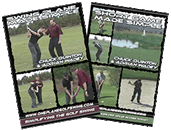by Chuck Quinton
Understanding How to Improve Your Mental Game |
Rotary Swing Golf |
Now Just Stop Trying
By now, you've stopped trying to improve after reading my first article and have taken some pressure off your game. Now it's time to take the next step in our journey towards "Mushin Golf." Now I want you stop trying completely. Stop "trying" to do things in your golf game and you will definitely improve your scores.
When I coach golfers on the mental side of the game, I like to give them "tools" during each session that they can immediately take to the course and begin applying. During my first session, I almost always deal with golfers who have become over analytical with their golf swings and begin to get very judgemental with themselves after a bad shot. They begin to break down their swing in their head, and in the process are tearing down their game. A tool I give them to help immediately return their focus back to the "moment" is a breathing technique that is very simple, yet very effective. The y always respond with something like "That's simple. That's all I have to do?" I reply with a simple yes and then we recap. At the end of the session, I always hear the golfer say "Ok, I'm going to try the breathing technique when I begin to lose focus this week." Try, I ask them? "You just said how simple it was, why would you have to try and focus on your breathing?" By definition, if you are trying to do something, you must not believe that you are fully capable of success, otherwise, why would you say that you are going to try? You wouldn't, you would simply "do". The difference between "doing" and "trying" is the difference between confidence and mistrust and success and failure.
Most golfers have a lot of "try" in their games. They try to hit a drive down the middle, or they try and make that 4 footer for par, or they try and not analyze their bad shots. They "try" at everything and end up destroying any chance of playing to their potential. In truth, if the golfer would get rid of the word try from his vocabulary, his scores would improve instantly. A golfer could then stand over a shot to a tucked left side pin near the water's edge and say to themselves "I'm going to hit a draw to that pin." That sounds much better and instills much more confidence than saying "I'm going to try and hit a draw to that pin," doesn't it? That's not to say that if you've never hit a draw in your life you are all of a sudden going to hit one, but you are opening yourself up to playing to your potential when you don't doubt your ability.
All golfers struggle with doubt even Ben Hogan. It is, perhaps, the single greatest killer of the golf swing. In Hogan's "Five Lessons", he admitted that it wasn't his technique that kept him from winning, it was his lack of trust in his ability. Let me quote him directly from "Five Lessons" starting on page 113:
"...But my self-doubting
never stopped. Regardless of how well I was going,
I was still concerned about the next day and the
next day and the next.
To me, that is THE SINGLE MOST IMPORTANT THING Ben Hogan ever wrote. It's not the cupped wrist, the braced right leg, the movement of the hips or anything else. It's that Hogan finally stopped doubting himself and stopped trying. It's funny that I've never seen another golf instructor talk about this, but it makes sense. Most instructors and golfers alike get bogged down in the technical detail of the swing that they never get to the "end of the book." It's kind of an inside joke to me, it's as if Hogan wrote in great detail about the technicalities of the grip, the hips, the swing plane etc., knowing that all his competitors would read his book and get overwhelmed to the point of not being able to swing a golf club, only to say at the very end that it was just a joke. Of course, I don't believe that to be true, but one could read in a bit of whimsy if so inclined.
During your next round of golf, stand over your shots with a certain disregard for the outcome. Stop caring without being careless. If you aren't so consumed by the results of your shot, you won't feel as if you have to try so hard and will finally begin to open yourself up to hitting more consistent golf shots with less effort. It might feel like you're not even trying ;-)
|
|
Articles Stop
"Improving" Now Just
Stop Trying - How Ben Hogan Became Great For More Mental Game Articles and to learn about "Mushin Golf", please visit the Members Vault |
|
| [an error occurred while processing this directive] | [an error occurred while processing this directive] |
[an error occurred while processing this directive]
[an error occurred while processing this directive] |


